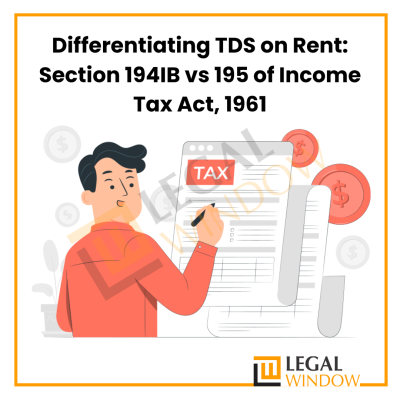What Non-Resident needs to know about the acquisition of an Immovable Property?
- September 28, 2022
- Income Tax
 The Reserve Bank of India (RBI) regulates the purchase and acquisition of immovable property in India by non-residents under the Foreign Exchange Management Act (FEMA). An Indian citizen residing outside India as per FEMA is an NRI (Non-Resident Indian) while a non-Indian citizen who or whose parents or grandparents were born in India etc. is considered an OCI (Overseas Citizen of India). Let us know about the acquisition of immovable property by a Non-Resident in India.
The Reserve Bank of India (RBI) regulates the purchase and acquisition of immovable property in India by non-residents under the Foreign Exchange Management Act (FEMA). An Indian citizen residing outside India as per FEMA is an NRI (Non-Resident Indian) while a non-Indian citizen who or whose parents or grandparents were born in India etc. is considered an OCI (Overseas Citizen of India). Let us know about the acquisition of immovable property by a Non-Resident in India.
Who is considered a Non-Resident of India or NRI?
According to the FEMA Act, 1999, a resident of India is defined as a person who is resident in India for more than one hundred and eighty-two days during the preceding financial year and who has come to India or is staying in India to obtain employment, carrying on a trade or profession in India or for any other purpose which would indicate his intention to remain in India for an indefinite period. Therefore, any person who does not fulfill the above condition is considered a non-resident Indian. In simple terms, one has to fulfill both the conditions of 182 day stay in India and fulfill the purpose/intent of the stay to be a resident of India.
Who can buy real estate in India?
To determine who can or cannot buy real estate in India, it would be wise to first find out what categories of persons are listed in the law. They are as follows:
Indian citizen: The Citizenship Act of 1955 provides four ways in which a person can acquire Indian citizenship. This could be through birth, descent, or registration as set out in sections 3, 4, 5, and 6 of the Act.
NRI: A person who stays abroad for employment or business is generally called an NRI. Legally, an NRI – Non-Resident Indian is an Indian citizen who lives in a foreign country for more than 180 days in a financial year.
PIO: Short for Persons of Indian Origin, a PIO is an individual who is now settled in a foreign country. A PIO can be any of the following people:
- A person who was born in India or whose parents/grandparents/grandparents were born in India or were permanently resident in the country or any of the territories which became part of the country under the Government of India Act, 1935.
- A person who has held an Indian passport in his name in the past.
- A person who is the spouse of an Indian citizen residing in India only.
OCI: short for Overseas Citizen of India, is a person who is formally a citizen of another country, but Indians are granted several rights and freedoms. India does not allow dual citizenship, OCI is as close as it gets. They can be:
- Spouse of an Indian citizen who has been married for at least two years.
- Children of an Indian parent or grandparent.
- Children and grandchildren of OCI holders.
- Foreign national.
Finally, after removing the above categories and citizens of India residing in the country, we are left with individuals called foreign nationals.
The Foreign Exchange Management Act, 1999 (FEMA) along with regulations issued by the Reserve Bank of India (RBI) largely govern the process of acquisition and transfer of real estate in India. Of the above categories, PIOs, OCIs, and NRIs can acquire and transfer immovable property in India subject to certain conditions, while a foreign national cannot.
Buying residential or commercial properties by NRI
The Reserve Bank of India issues guidelines from time to time that explains the law and grant general permission to NRIs to purchase certain immovable properties in India without going to the RBI for permission. Through these guidelines, the RBI has granted general permission to NRIs to purchase certain immovable properties in India. According to these guidelines, NRIs can buy residential or commercial properties in India, but they are not allowed to buy any agricultural land or plantation in India. As it is fashionable to own a farm, it is important to note that as per the existing exemptions, NRIs cannot buy a farmhouse in India. This way, if the NRIs’ investments in India are either in residential real estate or commercial real estate, they may not even be required to report such purchases to the RBI, even after the transaction closes. Moreover, there is no limit on the number of residential or commercial properties an NRI can buy in India.
Documents filed with RBI after purchase
Some documents have to be filed with the Reserve Bank of India after the purchase
Purchase of residential/commercial properties is subject to general permission and as such the PIO need not file any specific documents with the Reserve Bank of India. The same is the case with NRIs. Properties other than agricultural land generally require the following documents:
- OCI card (in case of OCI)
- Passport (in case of NRI)
- Passport size photo
- Address proof
- Pan card (permanent account number)
Method of payment for buying property in India
For the purchase of permitted properties in India, the NRI has to either pay through the bank channel by transfer from abroad or the NRI can use the balance in his NRE/NRO or FCNR account. Since money for this purpose must come only through authorized channels, including banking channels, payment cannot be offered in the form of traveler’s cheques or foreign currency in India. NRIs can even finance the purchase of a residential house with a home loan in Indian rupees. A home loan can be provided by the Indian employer of the NRI employee to finance the property or by a housing finance company or bank.
As regards EMI payments for servicing Home Loan taken in Indian currency in India, the same can be done either by direct transfer from abroad or from the loan money lying in the NRE/NRO/FCNR account of the NRI. In addition to the sources mentioned above, the housing loan can also be repaid from rent received from such property or money transferred to the borrower’s account from the account of relatives of a borrower.
Others permitted the acquisition of the real estate
Apart from buying a property, an NRI can also acquire any residential or commercial property by way of a gift from any of his NRIs, OCIs, or resident relatives. Although an NRI is not allowed to purchase agricultural land etc. in India, he can inherit the same from any person resident in India. Inheritance can be done either through a will and from a non-relative, or from a relative under personal law if a valid will is not drawn up. Further, an NRI can inherit any immovable property in India from another NRI provided that the NRI acquired the same under the permitted rules applicable at the time he acquired it.
Prolongation of immovable property by resident becoming non-resident
A resident who later becomes an NRI can continue to hold any immovable property including agricultural land, farmhouse, etc. acquired while resident in India.
Category of NRI free to purchase property under the general permission available
Non-Resident Indians (NRIs), that is citizens of India, residing outside India and Persons of Indian Origin (PIOs) (not currently citizens of Pakistan or Bangladesh or Sri Lanka or Afghanistan or China or Iran or Nepal, or Bhutan) who were at any time a holder of an Indian passport or whose father or grandfather was a citizen of India is subject to a general permit. Persons covered by general permission are free to purchase residential and/or commercial properties in India.
 Final words
Final words
As the real estate market in India has seen rapid growth over the past decade, there is a huge interest in buying real estate in India from non-Indian residents. We have understood in this article the relevant rules and regulations regarding the acquisition and transfer of immovable property in India by Non-Resident Indians [NRIs], Foreigners, and Foreigners of Indian Origin.
CA Pulkit Goyal, is a fellow member of the Institute of Chartered Accountants of India (ICAI) having 10 years of experience in the profession of Chartered Accountancy and thorough understanding of the corporate as well as non-corporate entities taxation system. His core area of practice is foreign company taxation which has given him an edge in analytical thinking & executing assignments with a unique perspective. He has worked as a consultant with professionally managed corporates. He has experience of writing in different areas and keep at pace with the latest changes and analyze the different implications of various provisions of the act.
Categories
- Agreement Drafting (23)
- Annual Compliance (11)
- Change in Business (36)
- Company Law (148)
- Compliance (90)
- Digital Banking (3)
- Drug License (3)
- FEMA (17)
- Finance Company (42)
- Foreign Taxation (6)
- FSSAI License/Registration (14)
- GST (120)
- Hallmark Registration (1)
- Income Tax (202)
- Latest News (34)
- Miscellaneous (165)
- NBFC Registration (8)
- NGO (14)
- SEBI Registration (6)
- Section 8 Company (7)
- Start and manage a business (21)
- Startup/ Registration (130)
- Trademark Registration/IPR (40)
Recent Posts
About us
LegalWindow.in is a professional technology driven platform of multidisciplined experts like CA/CS/Lawyers spanning with an aim to provide concrete solution to individuals, start-ups and other business organisation by maximising their growth at an affordable cost.








